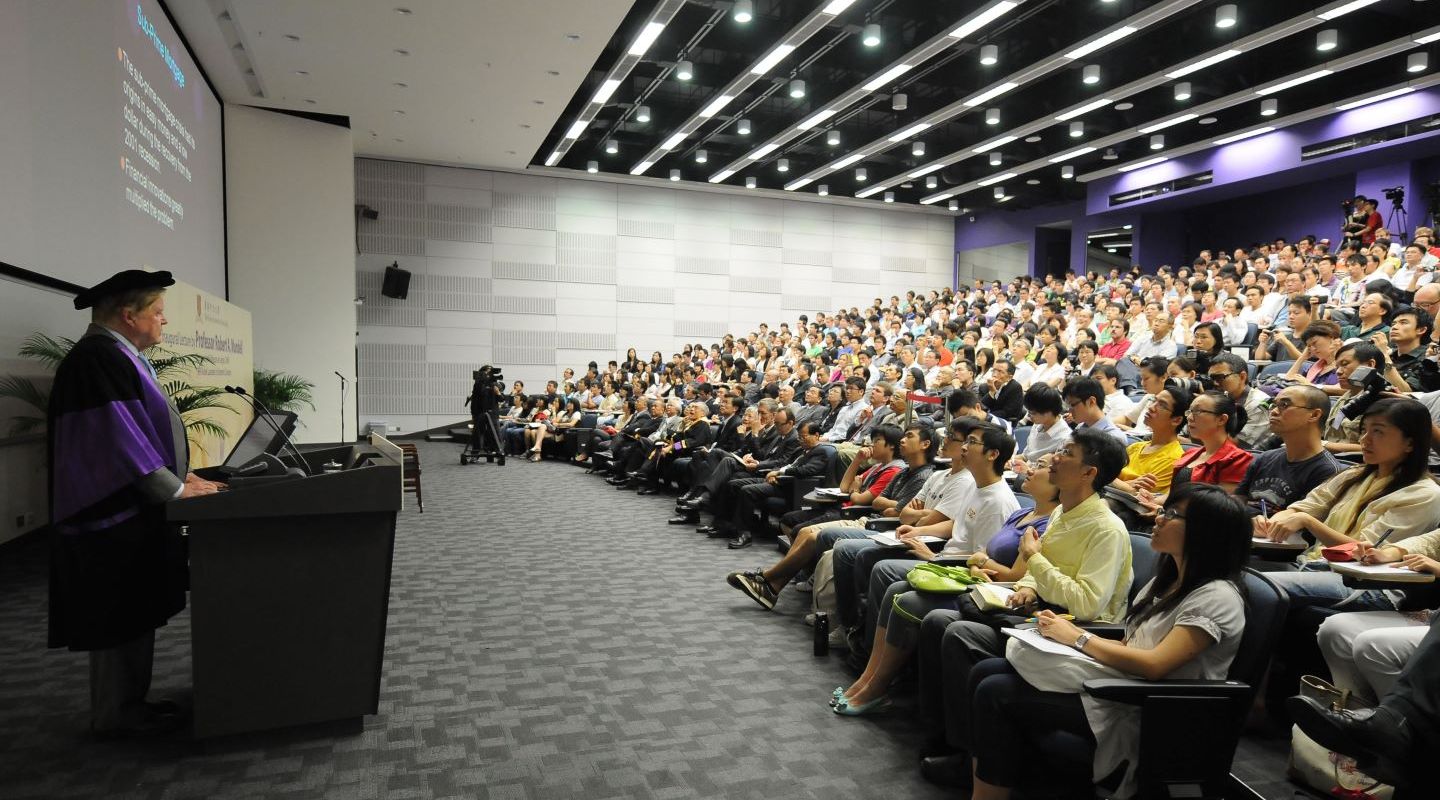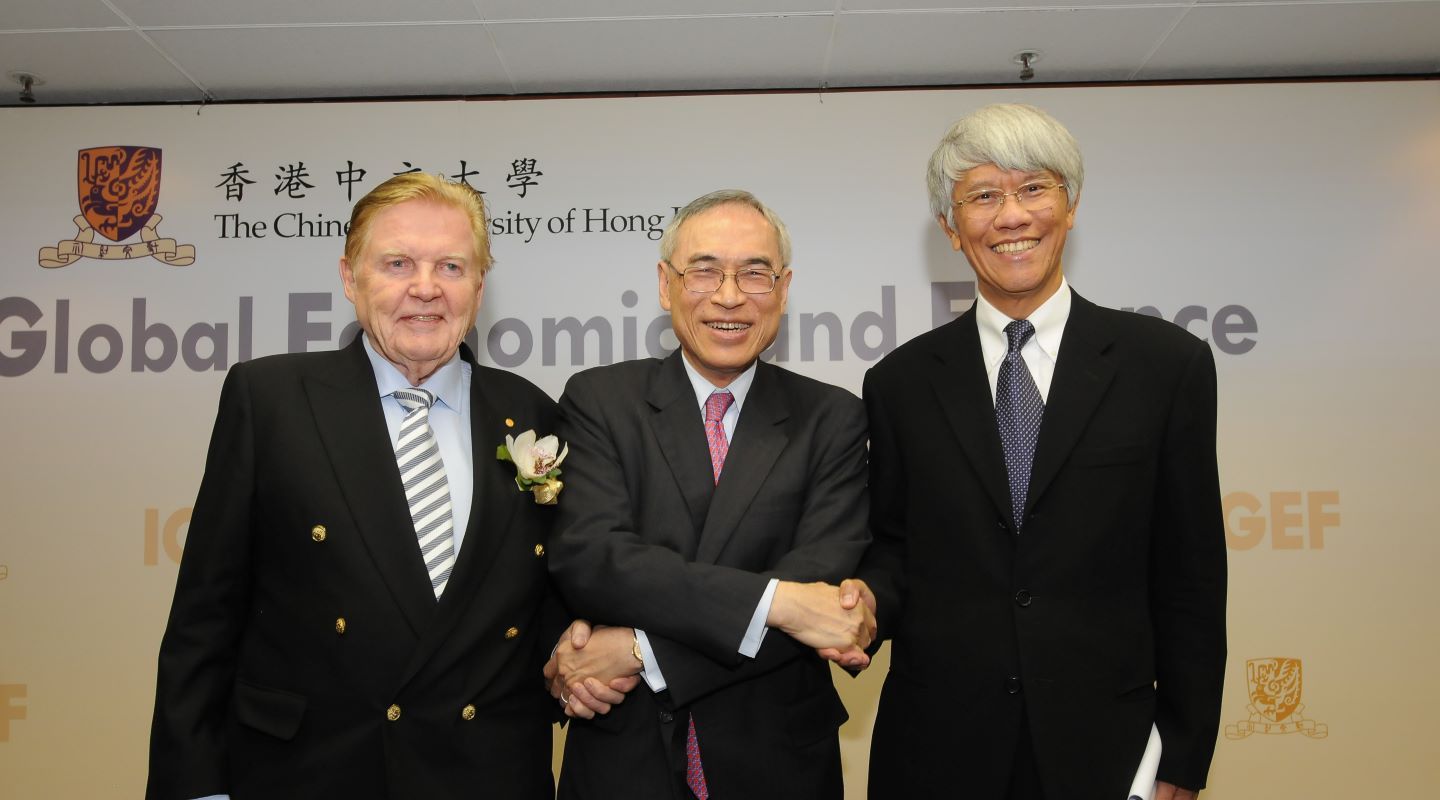In Remembrance of Professor Robert Alexander MundellA Tribute by Professor Lawrence J. Lau
April 2021

My colleagues at The Chinese University of Hong Kong and I are immensely saddened to learn of the passing of Prof. Robert Mundell. We are most honoured to have had him as our Distinguished Professor-at-Large since 2009. He was an intellectual giant and a most respected leader of the Economics profession. He has been responsible for many innovative and original ideas in the fields of international economics and finance. His work on 'optimum currency areas' and the 'Mundell-Fleming Model' were truly path-breaking. For me personally, Bob has been a great friend and teacher. I have learned a great deal from him, from his lectures and from our discussions over the years. Bob used to visit China very often to offer his advice and expertise to the state leaders. He was the holder of a Chinese 'green card' (a 'permanent resident' card). A university in Beijing, the Mundell International University for Entrepreneurship, was named in his honour. I remember fondly the times we spent together in China and Hong Kong at various conferences and fora. I particularly treasured the annual Santa Colomba Conferences, that Bob and Valerie, his wife, hosted in a magnificent castle near Siena. We shall all miss Bob dearly!
Professor Mundell is known as the 'Father of the Euro', the common currency currently used by 19 member countries of the European Union. The advantages of a single common currency for the European Union follow in a straightforward way from his work on optimum currency areas. (Can we imagine a United States today, with 50 different currencies, one for each state? Interstate commerce would have grounded to a standstill.) The Euro Area has clearly benefitted from the introduction of the Euro. Enterprises in the Euro Area have been able to consolidate and achieve both efficiency and scale. Intra-Euro Area trade actually rose significantly after the introduction of the Euro. Of course, foreign tourists to Europe also benefitted from the convenience of not having to keep exchanging currencies from country to country. But the major gains accrue to the Europeans themselves. They can now trade without having to worry about the fluctuations of their relative exchange rates.

Among Professor Mundell's influential discoveries is the concept of the 'Impossible Trinity', which says that it is impossible for an economy to have simultaneously all of the following: a fixed exchange rate for its currency, free cross-border (and cross-currency) flows of capital (no capital controls), and an independent monetary policy (meaning an independent interest rate). It can have at most two out of the three at any one time. The logic of the 'Impossible Trinity' is impeccable. For example, China, for a long time, had a more or less fixed exchange rate with the US dollar, and a monetary policy independent of the interest rate set by the US Federal Reserve Board, but had to maintain capital controls.
However, in my discussions with Professor Mundell, we recognized that with the imposition of a Tobin tax (named after Prof. James Tobin, another Nobel Laureate in Economic Sciences) on both cross-border capital inflows and outflows, of say 1%, an economy could have a range for an independent interest rate differential with the rest of the world of up to 2%, while maintaining simultaneously a fixed exchange rate, free (albeit taxed) cross-border capital inflows and outflows, and an independent monetary policy. This is because for foreign investors, unless the gross interest rate differential between this particular economy and the rest of the world is greater than 2%, they would have no interest to engage in interest rate arbitrage, as any additional interest earned will be insufficient to cover the 1% taxes on both entry and exit.

Another important and potentially productive original idea developed by Professor Mundell is 'Incentive-Compatible Exchange-Rate Coordination'. Almost all exporters, importers and foreign direct investors prefer relative stability of the exchange rates to wild volatility. It is actually beneficial to everyone if short-term fluctuations in the relative exchange rates can be contained within a reasonable range. The US should not want to see the Euro devalued too much relative to the US dollar, because it would hurt US exports, not only to the Euro Area, but also in third markets around the world (for example, the Airbus would become cheaper than Boeing aircrafts). Similarly, the Euro Area should not want to see the US dollar devalued too much relative to the Euro. What Professor Mundell had in mind is for the US and the Euro Area to agree on an acceptable range of fluctuations for the Euro/US$ exchange rate. When the devaluation of the Euro hits the limit of the agreed range (that is, when the number of Euros per US$ reaches a new high), the US would purchase Euros with US dollars, thus decreasing the number of Euros per US$ and preventing the Euro/US$ exchange rate from rising further. Similarly, when the appreciation of the Euro hits the other limit of the range (that is, when the number of Euros per US$ falls to a new low), the Euro Area will sell Euros for US dollars, thus increasing the number of Euros per US$ and preventing the Euro/US$ exchange rate from falling further. The proposed arrangement is 'incentive-compatible' because the US side intervenes when the Euro has devalued too much relative to the US$, so as to help its exporters, and to maintain its GDP and employment. Similarly, the Euro Area side intervenes when the Euro has appreciated too much relative to the US$, so as to help its exporters. Both sides have the incentive to act at precisely the right moments.
Professor Mundell proposed this coordination arrangement initially between the US$ and the Euro. The US dollar and the Euro between them account for more than 80% of the cross-border clearings and settlements in the world today. Such an arrangement would cement the dominance of the combined US$-Euro in world settlements. However, the same arrangement may potentially also be used between the US dollar and the Renminbi, and both China and the US would benefit. The losers will be the commercial banks which specialize in currency exchanges and speculations.
Professor Mundell's many innovative and original ideas have resulted in important practical and useful applications. We shall all miss him!
Professor Lawrence J. Lau
Ralph and Claire Landau Professor of Economics
Lau Chor Tak Institute of Global Economics and Finance
The Chinese University of Hong Kong

